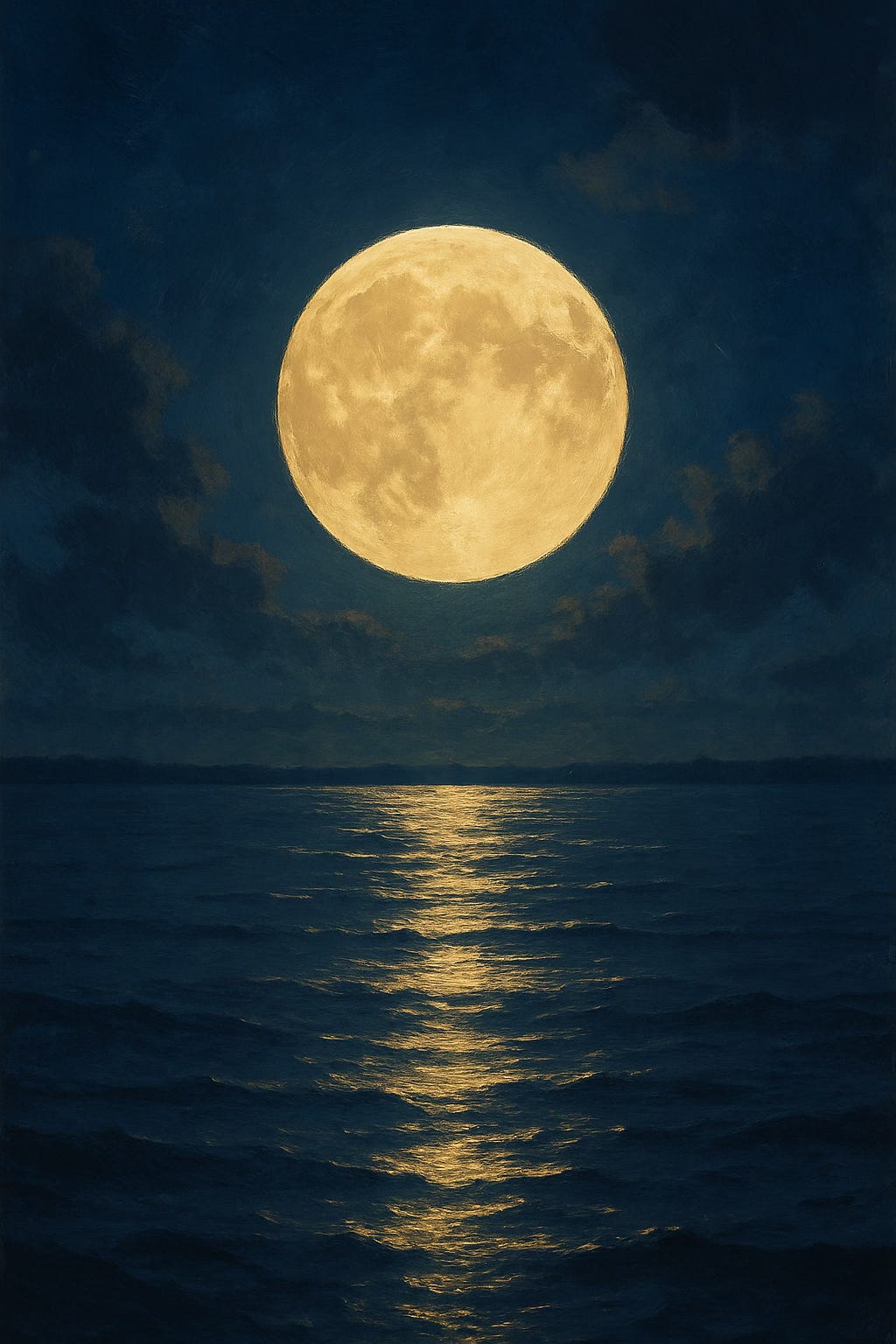Like the Moon on Water
How Fiction Quietly Pulls Us Toward the People We Hope To Be
We grow up believing heroism looks like thunder.
The books we love, the movies we memorize, so many of them teach us that to be good in a broken world is to rise up, sword in hand, to make a grand, visible stand.
To stop the train, storm the castle, face the villain head-on.
It’s no wonder that when the real world asks us to be brave, we sometimes hesitate: unsure where our soundtrack went, confused when no crowd is watching.
But, what if that’s not the point?
What if the most meaningful heroism isn’t about being watched at all?
What if it doesn’t look like a climax, but rather a pause?
Fiction as Rehearsal
Psychologist Keith Oatley once described fiction as a “flight simulator for the mind.”
It doesn’t teach us what to think, but how to feel, and how to pause when it counts.
The best stories are not instruction manuals. They are mirrors and maps.
They lay down grooves in our minds, subtle, invisible paths that make it easier to choose wisely when the moment arrives.
We engage with stories not just to observe change but to practice it.
A character’s inner conflict becomes a kind of emotional rehearsal. Their hesitation, their courage, their empathy, all of it builds internal memory in us.
When we’re faced with real-life complexity, when a conversation turns tense, or we’re tempted to snap. or we feel the urge to retreat, we don’t rise to the level of our expectations, we fall to the level of our training.
And sometimes that training was a line of dialogue from a book we read a decade ago.
What are you thinking about after reading this? Feel free to leave a comment, I’d love to hear.
The Quiet Hero
Most heroism isn’t cinematic. It’s not dramatic, sweeping, or conclusive.
It’s not “winning” but rather restraint. Curiosity. The act of waiting one extra breath before reacting.
Sometimes, the most courageous thing we do is not escalate.
Sometimes it’s turning toward the person we’re tempted to write off, or saying “I don’t know,” when certainty feels safer.
These choices rarely make headlines. But they shape the world around us more than we realize.
And they’re often the direct result of fiction we’ve carried with us: stories that rehearsed us quietly for this very moment.
The Double-Edged Sword
But fiction can deceive us, too.
When we’re told, over and over, that being a hero means being exceptional, loud, or certain, we may miss the fact that the most essential forms of courage rarely look that way.
We may grow disillusioned with our quiet contributions. We may think they don’t count.
Fiction has power. That power cuts both ways.
It can equip us, and it can also set us up to feel small when our lives don’t resemble the epics we’ve internalized.
Like the Moon on Water
The moon doesn’t command the tides.
It doesn’t shout, or point, or demand.
It simply is.
And because it is, the oceans move.
Its presence creates rhythm.
Its gravity reshapes coastlines.
Fiction works the same way.
A remembered story, a half-sentence that floats back to us in a moment of uncertainty, can become gravity.
It doesn’t tell us what to do. It just pulls. It shapes motion.
It creates pause.
That pause is everything.
To hesitate before acting. To reframe the situation.
To ask: Who do I want to be in this moment?
The real work begins in that internal alignment.
In memory.
In the subtle re-shaping of instinct over time.
Becoming the Person the Moment Asks For
The truth is, most of us will never face a dragon.
But we will face despair.
Misunderstanding.
Grief.
Injustice.
The question isn’t whether we’ll be offered moments that matter.
The question is how we’ll meet them.
And if we’ve trained.. If we’ve let stories whisper to us, guide us, settle into us like sediment.. Then maybe, when the time comes, we won’t need to reach for courage.
Maybe we’ll simply remember who we are.
Like the tide remembering the moon.
I write for free, once or twice a week, but the real joy is hearing from readers. You’re always welcome to respond. Hit 'reply' or send me a message below.
Further reading:
For more like this, follow me wherever you connect with friends:
Bluesky 💖 LinkedIn 💖 Mastodon 💖 X 💖 Instagram 💖 TikTok 💖 Threads 💖 YouTube 💖 Facebook
With love, Bri Chapman






I found you through Stephanie Bell, and I always appreciate what you share, the way you are working to ground activism in something deeper, in love and belonging rather than outrage.
And I agree that stories can guide us in both directions. We have models of wisdom and seeing more deeply - Gandalf comes to mind. And we have the imagery of interconnection, belonging to a greater whole among the Na'vi of Avatar and in many other stories. But we also have the nearly-universal-in-fiction trope of good vs. evil, the evilly-evil bad guys who are so corrupted, so empty of love and humanity that they must be destroyed. And of course we must be vigilant for any secretly-evil infiltrators among our allies, must be ready to cast them out when they slip up and show themselves...
As I shared in my last post, I feel that our stories need to become grounded, in our shared experience of aliveness, wonder, thousands of meals and hugs and conversations, billions of heartbeats. Beneath all of our conflicting, chaotic stories there is one story that we all share.
As a longtime lover of books, this really spoke to me. There are characters I have loved and/or admired so much, they are like real people in my life! And I love how this essay meandered from books to the moon and the wisdom of the natural world which plays its own formative role in all of our lives (whether we see this truth or not). I especially loved this, Bri: "The question isn’t whether we’ll be offered moments that matter. The question is how we’ll meet them." Amen! <3